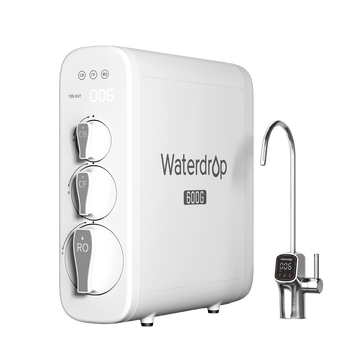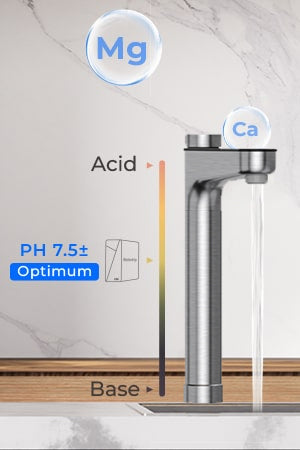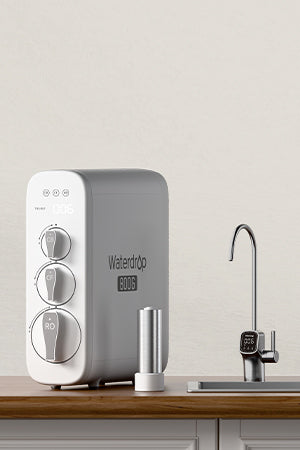Beim Thema Trinkwasser wirft die Temperatur oft mehr Fragen auf als sie beantwortet. Manche glauben, kaltes Wasser sei gesundheitsschädlich, andere empfinden es als erfrischend und belebend. Aber ist kaltes Wasser wirklich schädlich?
In diesem Artikel gehen wir auf die gesundheitlichen Bedenken im Zusammenhang mit kaltem Wasser ein. Außerdem zeigen wir Ihnen, wie Sie die Qualität Ihres Trinkwassers unabhängig von dessen Temperatur sicherstellen können.
Die Mythen rund um kaltes Wasser
Über kaltes Wasser kursieren seit jeher verschiedene Missverständnisse, von denen viele in kulturellen Praktiken und persönlichen Erfahrungen begründet liegen. Schauen wir uns einige der gängigsten Behauptungen an.
Kaltes Wasser verlangsamt die Verdauung
Einer der häufigsten Gründe, warum Menschen kaltes Wasser meiden, ist der Glaube, dass es die Verdauung beeinträchtigen kann. Die Theorie besagt, dass kaltes Wasser die Blutgefäße im Magen verengen und so den Verdauungsprozess verlangsamen kann.
Für diese Behauptung gibt es jedoch keine überzeugenden wissenschaftlichen Beweise. Zwar kann das Trinken von kaltem Wasser bei manchen Menschen zu Völlegefühl oder Unwohlsein führen, doch hat es in den meisten Fällen keinen nennenswerten Einfluss auf die Verdauung. Die Verdauung ist ein komplexer Prozess, und die Temperatur der von uns konsumierten Flüssigkeiten hat kaum oder gar keinen Einfluss auf die Gesamtgeschwindigkeit der Verdauung.
Kaltes Wasser kann Halsreizungen verursachen
Ein weiterer häufig geäußerter Einwand ist, dass kaltes Wasser den Hals reizen kann, insbesondere in den kälteren Monaten. Manche Menschen empfinden das Trinken von kaltem Wasser als belastend für den Hals oder als Verschlimmerung von Husten und Schnupfen. Dies dürfte eher auf eine individuelle Empfindlichkeit als auf eine allgemeine Wirkung von kaltem Wasser zurückzuführen sein.
Wer zu Halsreizungen neigt, sollte bei Halsschmerzen oder Erkältung sehr kalte Getränke meiden. Für die meisten Menschen birgt das Trinken von kaltem Wasser in Maßen jedoch keine nennenswerten Risiken für Hals und Atemwege.
Kaltes Wasser verringert die Hydratationseffizienz
Es herrscht die Annahme, dass kaltes Wasser vom Körper langsamer aufgenommen wird als Wasser mit Zimmertemperatur. Die Theorie besagt, dass der Körper mehr Energie aufwenden muss, um kaltes Wasser auf Körpertemperatur zu erwärmen, was die Flüssigkeitsaufnahme beeinträchtigen könnte. Zwar ist es richtig, dass der Körper versucht, kaltes Wasser zu erwärmen, der Effekt auf die Flüssigkeitsaufnahme ist jedoch minimal. Die Aufnahmerate des Körpers wird durch die Wassertemperatur nicht wesentlich beeinflusst.
Die Europäische Behörde für Lebensmittelsicherheit (EFSA) Empfohlen wird eine tägliche Flüssigkeitszufuhr von 2,5 Litern für Männer und 2,0 Litern für Frauen, um eine optimale Hydratation zu gewährleisten. Diese Empfehlung bezieht sich auf die Wassermenge, nicht auf die Temperatur. Ihr Körper kann Wasser jeder Temperatur effektiv aufnehmen, solange Sie über den Tag verteilt ausreichend trinken. Ob kalt, warm oder zimmerwarm – ausreichende Flüssigkeitszufuhr ist der Schlüssel zu guter Gesundheit.
Die Vorteile von kaltem Wasser
Entgegen der gängigen Mythen bietet kaltes Wasser einige Vorteile, insbesondere wenn es im richtigen Kontext konsumiert wird. Schauen wir uns einige dieser Vorteile genauer an.
Erfrischend und belebend
Kaltes Wasser wird oft als erfrischender empfunden, besonders an heißen Tagen oder nach körperlicher Anstrengung. Viele Menschen finden, dass gekühltes Wasser ihren Durst schnell löscht und dem Körper einen kühlenden Effekt verleiht, vor allem bei warmem Wetter. Tatsächlich kann das Trinken von kaltem Wasser helfen, die Körpertemperatur zu senken, wenn es zu heiß wird, was besonders nach dem Sport oder in heißen Klimazonen von Vorteil sein kann.
Steigert den Stoffwechsel
Das Trinken von kaltem Wasser kann den Stoffwechsel leicht ankurbeln. Beim Trinken von kaltem Wasser muss der Körper Energie aufwenden, um das Wasser auf Körpertemperatur zu bringen, was zu einem geringfügigen Anstieg des Kalorienverbrauchs führen kann. Obwohl der Effekt gering ist, kann er zum Gesamtenergieverbrauch beitragen und eine sinnvolle Ergänzung zu einem ausgewogenen, gesunden Lebensstil sein.
Fördert die Flüssigkeitszufuhr
Manche Menschen trinken kaltes Wasser lieber und empfinden es als angenehmer, wodurch sie eher dazu neigen, den ganzen Tag über ausreichend Flüssigkeit zu sich zu nehmen. Ausreichende Flüssigkeitszufuhr ist für verschiedene Körperfunktionen unerlässlich, darunter die Erhaltung gesunder Haut, die Regulierung der Körpertemperatur und die Unterstützung der kognitiven Leistungsfähigkeit. Wenn Sie durch das Trinken von kaltem Wasser dazu angeregt werden, mehr zu trinken, ist dies gut für Ihre Gesundheit.
Sicherstellung der Qualität Ihres Trinkwassers
Die Wassertemperatur ist zwar Geschmackssache, die Wasserqualität jedoch weitaus wichtiger. Leitungswasser ist oft unbedenklich, kann aber mitunter Verunreinigungen wie Chlor, Fluorid, Blei oder Bakterien enthalten. Diese Verunreinigungen stellen zwar möglicherweise keine unmittelbare Gefahr dar, können aber mit der Zeit Ihre Gesundheit und den Geschmack Ihres Wassers beeinträchtigen.
Um sicherzustellen, dass Ihr Wasser sauber und trinkbar ist, sollten Sie die Verwendung eines/einer
Wasserfiltersystem Die
Umkehrosmose-Wasserfilter Sie zählen zu den effektivsten Methoden zur Wasserreinigung und reduzieren eine Vielzahl von Verunreinigungen, darunter Schwermetalle und schädliche Chemikalien.
Für alle, die auf der Suche nach einer zuverlässigen und komfortablen Möglichkeit sind, gereinigtes Wasser in der perfekten Temperatur zu genießen, ist der Waterdrop A1 Umkehrosmose-Wasserspender mit Heiß- und Kaltwasserfunktion die ideale Lösung. Dieses Tischgerät verfügt über eine fortschrittliche 6-stufige Filtration mit einer 0,0001 μm RO-Membran und UV-Sterilisation. Es entfernt effektiv über 1.000 Verunreinigungen, darunter PFAS, Fluorid und Blei, und garantiert so sauberes und gesundes Wasser.
Mit seinem intelligenten OLED-Display bietet der A1 eine benutzerfreundliche Bedienung und zeigt Wasserqualität, Temperatur, Wassermenge und Filterlebensdauer auf einen Blick an. Sie können ganz einfach aus 6 voreingestellten Temperaturstufen und 5 Wassermengen die passende für Ihre Bedürfnisse auswählen.
Tipps für sicheres Trinken von kaltem Wasser
Wenn Sie gerne kaltes Wasser trinken, aber Bedenken wegen möglicher Nachteile haben, finden Sie hier einige hilfreiche Tipps, damit Sie es unbesorgt genießen können:
Mäßigung ist der Schlüssel
Kaltes Wasser ist zwar erfrischend, sollte aber in Maßen getrunken werden, insbesondere zu den Mahlzeiten. Um Verdauungsbeschwerden vorzubeugen, ist es ratsam, direkt nach dem Essen keine großen Mengen kalten Wassers zu trinken.
Passen Sie es Ihren Bedürfnissen an.
Wenn Sie sich nach dem Trinken von kaltem Wasser unwohl fühlen, versuchen Sie es mit Wasser in Zimmertemperatur oder warmem Wasser. Achten Sie auf die Reaktion Ihres Körpers und wählen Sie die Temperatur, die Ihnen am angenehmsten ist.
Investieren Sie in sauberes, gefiltertes Wasser
Unabhängig davon, ob Sie kaltes oder warmes Wasser bevorzugen, sollte die Wasserqualität immer oberste Priorität haben.
Filtrationssystem stellt sicher, dass Ihr Wasser frei von schädlichen Verunreinigungen ist, sodass Sie unbesorgt trinken können.
Abschluss
Die Frage, ob kaltes Wasser schädlich ist, hängt oft von persönlichen Vorlieben und dem individuellen Gesundheitszustand ab. Für die meisten Menschen ist kaltes Wasser unbedenklich und kann sogar Vorteile bieten, insbesondere durch die erfrischende Flüssigkeitszufuhr und die leichte Anregung des Stoffwechsels. Wie auch immer man es genießt, wichtig ist, ausreichend sauberes und gesundes Wasser zu trinken.



























































